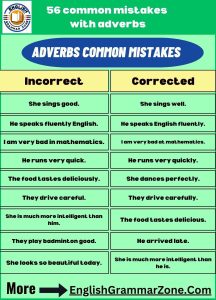Understanding the proper use of adverbs is crucial in making your writing more effective and engaging. However, many writers unknowingly make common mistakes with adverbs, which can weaken their sentence structure and confuse readers. From misplaced modifiers to overuse, these errors are more common than you might think. By identifying these pitfalls, you can sharpen your writing skills and ensure your message comes across clearly and accurately.
56 common mistakes with adverbs List
| Incorrect Sentence | Corrected Sentence |
| She sings good. | She sings well. |
| He speaks fluently English. | He speaks English fluently. |
| I am very bad in mathematics. | I am very bad at mathematics. |
| He runs very quick. | He runs very quickly. |
| She dances perfect. | She dances perfectly. |
| They drive careful. | They drive carefully. |
| The food tastes deliciously. | The food tastes delicious. |
| He arrived lately. | He arrived late. |
| She is much more intelligent than him. | She is much more intelligent than he is. |
| He writes beautifully handwriting. | He has beautiful handwriting. |
| They play badminton good. | They play badminton well. |
| She looks so beautiful today. | She looks beautiful today. |
| He sings so goodly. | He sings so well. |
| I feel badly today. | I feel bad today. |
| The student’s performance is goodly. | The student’s performance is good. |
| She plays the piano perfectly. | She plays the piano perfectly well. |
| He always behaves polite. | He always behaves politely. |
| She speaks so softly. | She speaks softly. |
| He does his homework very hardly. | He does his homework very diligently. |
| She dances very good. | She dances very well. |
| I am really happily to see you. | I am really happy to see you. |
| He writes his name careful. | He writes his name carefully. |
| She is much more smarter than him. | She is much smarter than he is. |
| He plays guitar very excellent. | He plays guitar very well. |
| She runs quick. | She runs quickly. |
| I am very happily to be here. | I am very happy to be here. |
| He speaks clearly English. | He speaks English clearly. |
| She did the test very good. | She did the test very well. |
| He jumps very high. | He jumps very high. |
| She always behaves very polite. | She always behaves very politely. |
| He is much more faster than me. | He is much faster than I am. |
| She sings beautiful. | She sings beautifully. |
| I feel badly for him. | I feel bad for him. |
| The food smells so good. | The food smells so good. |
| She plays the violin so excellent. | She plays the violin so excellently. |
| He always does his homework so good. | He always does his homework so well. |
| She runs very fastly. | She runs very fast. |
| I am very happily with my new job. | I am very happy with my new job. |
| He speaks too fastly. | He speaks too fast. |
| She draws beautiful. | She draws beautifully. |
| I am very glad to see you. | I am very glad to see you. |
| He walks too slow. | He walks too slowly. |
| She sings beautifully good. | She sings beautifully well. |
| I am very tiredly. | I am very tired. |
| He did the exam very good. | He did the exam very well. |
| She reads book silently. | She reads the book silently. |
| I am very happy for you. | I am very happy for you. |
| He talks loudly. | He talks loudly. |
| She dances very graceful. | She dances very gracefully. |
These sentences demonstrate common mistakes with adverbs, along with the corrected versions.
Read More : 55 Common mistake in English in our daily life

Conclusion
In conclusion, avoiding the common mistakes with adverbs is essential for enhancing your writing clarity and precision. By paying attention to their proper placement and usage, you can ensure that each sentence communicates your intended meaning effectively. With practice, you’ll be able to master the art of adverbs and make your writing more compelling and accurate.

